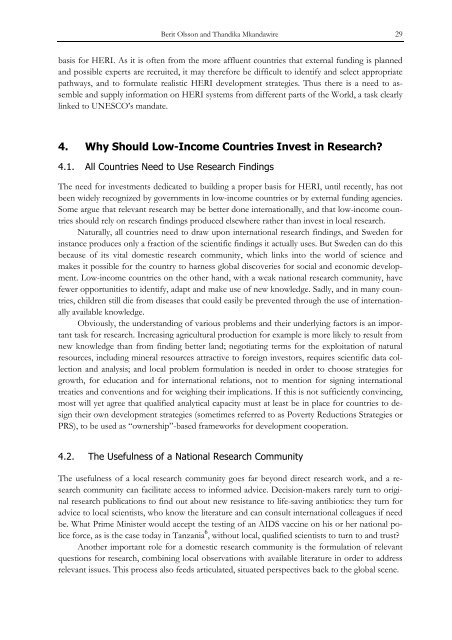Higher education, research and innovation ... - unesdoc - Unesco
Higher education, research and innovation ... - unesdoc - Unesco
Higher education, research and innovation ... - unesdoc - Unesco
Create successful ePaper yourself
Turn your PDF publications into a flip-book with our unique Google optimized e-Paper software.
Berit Olsson <strong>and</strong> Th<strong>and</strong>ika Mk<strong>and</strong>awire 29<br />
basis for HERI. As it is often from the more affluent countries that external funding is planned<br />
<strong>and</strong> possible experts are recruited, it may therefore be difficult to identify <strong>and</strong> select appropriate<br />
pathways, <strong>and</strong> to formulate realistic HERI development strategies. Thus there is a need to assemble<br />
<strong>and</strong> supply information on HERI systems from different parts of the World, a task clearly<br />
linked to UNESCO’s m<strong>and</strong>ate.<br />
4. Why Should Low-Income Countries Invest in Research?<br />
4.1. All Countries Need to Use Research Findings<br />
The need for investments dedicated to building a proper basis for HERI, until recently, has not<br />
been widely recognized by governments in low-income countries or by external funding agencies.<br />
Some argue that relevant <strong>research</strong> may be better done internationally, <strong>and</strong> that low-income countries<br />
should rely on <strong>research</strong> findings produced elsewhere rather than invest in local <strong>research</strong>.<br />
Naturally, all countries need to draw upon international <strong>research</strong> findings, <strong>and</strong> Sweden for<br />
instance produces only a fraction of the scientific findings it actually uses. But Sweden can do this<br />
because of its vital domestic <strong>research</strong> community, which links into the world of science <strong>and</strong><br />
makes it possible for the country to harness global discoveries for social <strong>and</strong> economic development.<br />
Low-income countries on the other h<strong>and</strong>, with a weak national <strong>research</strong> community, have<br />
fewer opportunities to identify, adapt <strong>and</strong> make use of new knowledge. Sadly, <strong>and</strong> in many countries,<br />
children still die from diseases that could easily be prevented through the use of internationally<br />
available knowledge.<br />
Obviously, the underst<strong>and</strong>ing of various problems <strong>and</strong> their underlying factors is an important<br />
task for <strong>research</strong>. Increasing agricultural production for example is more likely to result from<br />
new knowledge than from finding better l<strong>and</strong>; negotiating terms for the exploitation of natural<br />
resources, including mineral resources attractive to foreign investors, requires scientific data collection<br />
<strong>and</strong> analysis; <strong>and</strong> local problem formulation is needed in order to choose strategies for<br />
growth, for <strong>education</strong> <strong>and</strong> for international relations, not to mention for signing international<br />
treaties <strong>and</strong> conventions <strong>and</strong> for weighing their implications. If this is not sufficiently convincing,<br />
most will yet agree that qualified analytical capacity must at least be in place for countries to design<br />
their own development strategies (sometimes referred to as Poverty Reductions Strategies or<br />
PRS), to be used as “ownership”-based frameworks for development cooperation.<br />
4.2. The Usefulness of a National Research Community<br />
The usefulness of a local <strong>research</strong> community goes far beyond direct <strong>research</strong> work, <strong>and</strong> a <strong>research</strong><br />
community can facilitate access to informed advice. Decision-makers rarely turn to original<br />
<strong>research</strong> publications to find out about new resistance to life-saving antibiotics: they turn for<br />
advice to local scientists, who know the literature <strong>and</strong> can consult international colleagues if need<br />
be. What Prime Minister would accept the testing of an AIDS vaccine on his or her national police<br />
force, as is the case today in Tanzania 6 , without local, qualified scientists to turn to <strong>and</strong> trust?<br />
Another important role for a domestic <strong>research</strong> community is the formulation of relevant<br />
questions for <strong>research</strong>, combining local observations with available literature in order to address<br />
relevant issues. This process also feeds articulated, situated perspectives back to the global scene.

















